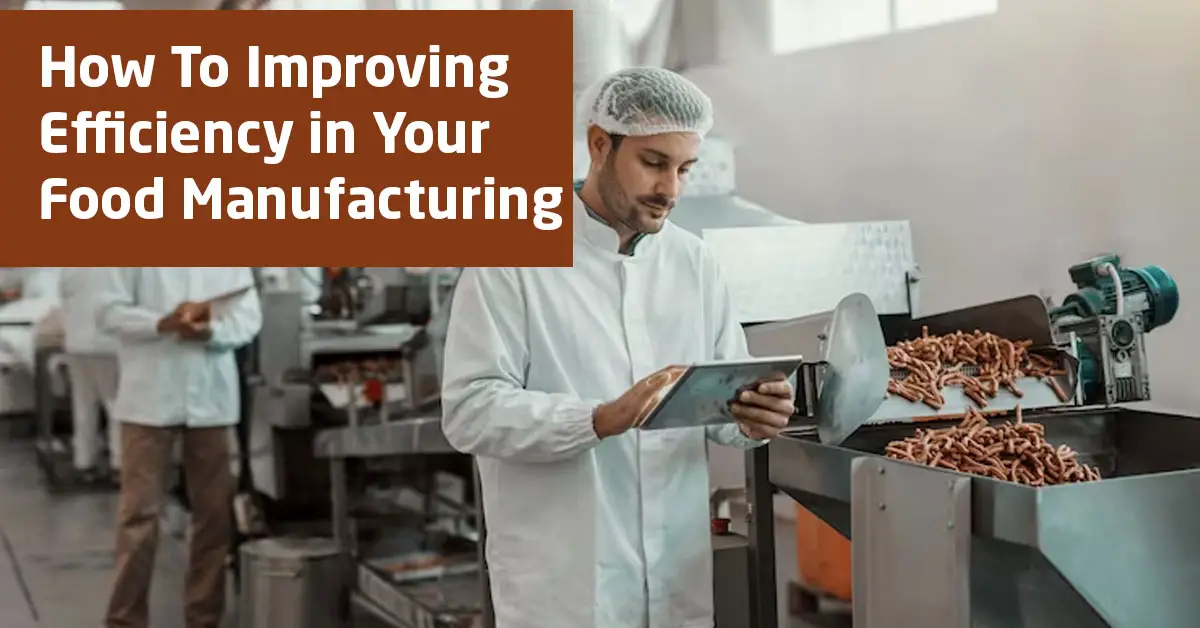In the dynamic landscape of food manufacturing, efficiency reigns supreme. Elevating production efficiency not only amplifies output but also bolsters profitability and responsiveness to market demands. Here, we delve into a plethora of tactics to elevate your food manufacturing operations to new heights of efficiency.
Embracing Automation for Enhanced Productivity
Automation Revolutionizing Food Manufacturing
In the quest for heightened production levels and reduced labor expenses, automation emerges as a pivotal game-changer for food producers. Automated systems excel at executing repetitive tasks with unparalleled precision and consistency compared to human labor.
This translates into amplified yields and superior product quality. Moreover, automation liberates human resources to concentrate on intricate, high-level operations that defy mechanization.
Integrating cutting-edge machinery like robotic arms and automated packaging lines slashes time-to-market for products. This not only augments output but also fortifies flexibility, enabling plants to swiftly adapt to shifting consumer preferences or urgent orders – a quintessential trait in the fast-paced food sector.
Automation contributes significantly to safety by executing high-risk tasks, thereby mitigating the likelihood of workplace mishaps. Enhanced safety protocols result in reduced insurance expenditures and heightened employee well-being.
Furthermore, by eliminating human error elements, automation markedly diminishes production mishaps. Crucially, this advancement entails the modernization of older equipment. For example, contemporary ammonia pumps tailored for refrigeration systems substantially bolster energy efficiency and reliability vis-à-vis outdated models.
Investing in state-of-the-art automation technology not only ensures staying abreast of the latest trends but also lays the groundwork for future advancements.
Optimizing Supply Chain Management for Raw Material Efficiency
Revolutionizing Supply Chain Dynamics
Efficient supply chain management is indispensable for orchestrating a seamless process from procurement to production. A meticulously planned supply chain guarantees timely arrival of requisite raw materials, curbing inventory expenses and the peril of spoilage – a pressing concern in the food domain.
Adopting inventory management software furnishes real-time insights to harmonize demand with supply adeptly. Collaborating closely with suppliers facilitates the establishment of dependable lead times and cultivates a mutual comprehension of requirements and capabilities.
Through strategic alliances, manufacturers can secure more favorable terms and access superior-quality raw materials. This not only enhances the final product but also averts costly production delays.
Transportation aspects warrant equal consideration. Transitioning to providers offering Esso Diesel, renowned for its fuel efficiency and cleaner combustion, can slash shipping expenses in logistics operations.
Strategic supply chain decisions coupled with the adoption of premium diesel culminate in a more efficient and sustainable manufacturing ecosystem.
Strengthening Quality Control Systems for Error Prevention
Fortifying Quality Assurance Frameworks
Robust quality control systems are indispensable in averting costly production blunders and recalls. Investing in cutting-edge testing and monitoring technology is instrumental in ensuring products adhere to requisite standards.
Automated inspection stations, for instance, excel at detecting defects or contamination imperceptible to the human eye, thereby safeguarding the brand’s reputation and consumer trust.
Data analytics and machine learning now play a pivotal role in augmenting quality control. By scrutinizing patterns from extensive production data sets, these technologies forecast potential quality glitches before their manifestation, thereby curbing waste and ensuring seamless operations on the production line.
Regular reviews and enhancements of quality control protocols ensure their alignment with evolving production techniques and regulatory stipulations. Maintaining an error-responsive system that swiftly imbibes lessons from past missteps is imperative to preempt future occurrences.
Investing in Employee Training and Engagement for Peak Performance
Empowering Human Capital for Optimal Output
The efficacy of a food manufacturing plant hinges significantly on the proficiency and commitment of its workforce. Investing in comprehensive training initiatives equips employees with the latest industry insights and methodologies, thereby fostering heightened performance and innovation.
Training should be perceived as an ongoing commitment to professional development rather than a one-time event. Active engagement is pivotal in maximizing workforce productivity.
Management strategies that cultivate inclusivity and acknowledge contributions culminate in reduced turnover rates and heightened employee contentment. Engaged employees exhibit a greater sense of ownership in their tasks, actively pursue efficiency enhancements, and contribute to a conducive workplace culture.
Cross-training employees to execute diverse tasks within the production line augments operational flexibility and cultivates a holistic understanding of the manufacturing process.
In conclusion, the journey towards optimal efficiency in food manufacturing entails a harmonious blend of technology, methodology, and human capital. By amalgamating these strategies, manufacturers can establish a resilient, efficient, and competitive food production facility primed to meet the ever-evolving demands of the market.
Questions and Answers:
Q1: How can automation contribute to efficiency in food manufacturing? A1: Automation streamlines repetitive tasks, boosts precision, and frees up human resources for higher-level operations, ultimately enhancing productivity.
Q2: What role does supply chain management play in improving efficiency? A2: Efficient supply chain management ensures timely access to raw materials, reduces inventory costs, and minimizes the risk of spoilage, thus enhancing overall efficiency.
Q3: Why is quality control essential in food manufacturing? A3: Quality control safeguards against production errors and recalls, maintains product integrity, and upholds consumer trust, critical for sustained success in the industry.
Q4: How does investing in employee training contribute to efficiency? A4: Comprehensive training programs equip employees with necessary skills, fostering innovation and performance, while active engagement cultivates a positive workplace culture, boosting overall efficiency.

